Digital Economy Module: The Effects of Internet on Child Development
VerifiedAdded on 2023/01/20
|9
|3278
|37
Essay
AI Summary
This essay, prepared for an HNC Business Studies Digital Economy module, investigates the multifaceted impacts of the internet on child development. It explores both positive and negative influences on children's social and cognitive development, addressing topics such as online relationships, the digital divide, and the rise of e-commerce. The essay references key research and studies, including those by Griffiths, Bremer, Wolak, and Montgomery, to provide a comprehensive overview of the internet's effects on children's lives, education, and health. The paper highlights the shift in communication styles, the emergence of virtual relationships, and the potential for both enhanced social skills and social isolation. It also examines the impact of the internet on academic performance, the potential for physical health issues, and the commercial influences of e-commerce on children. The essay concludes by emphasizing the need for further research to fully understand the long-term consequences of internet usage on children's development and cognitive abilities.
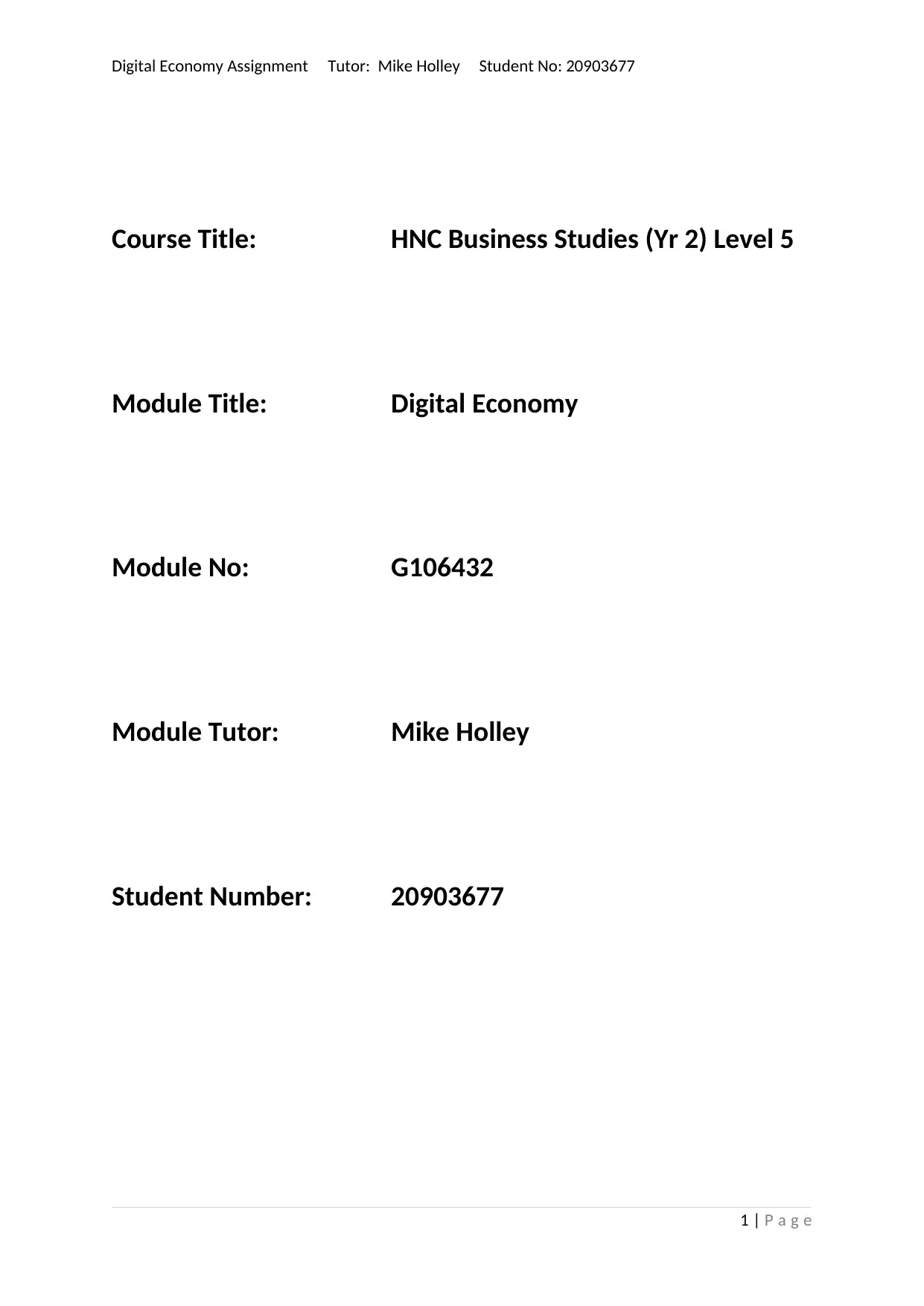
Digital Economy Assignment Tutor: Mike Holley Student No: 20903677
Course Title: HNC Business Studies (Yr 2) Level 5
Module Title: Digital Economy
Module No: G106432
Module Tutor: Mike Holley
Student Number: 20903677
1 | P a g e
Course Title: HNC Business Studies (Yr 2) Level 5
Module Title: Digital Economy
Module No: G106432
Module Tutor: Mike Holley
Student Number: 20903677
1 | P a g e
Paraphrase This Document
Need a fresh take? Get an instant paraphrase of this document with our AI Paraphraser
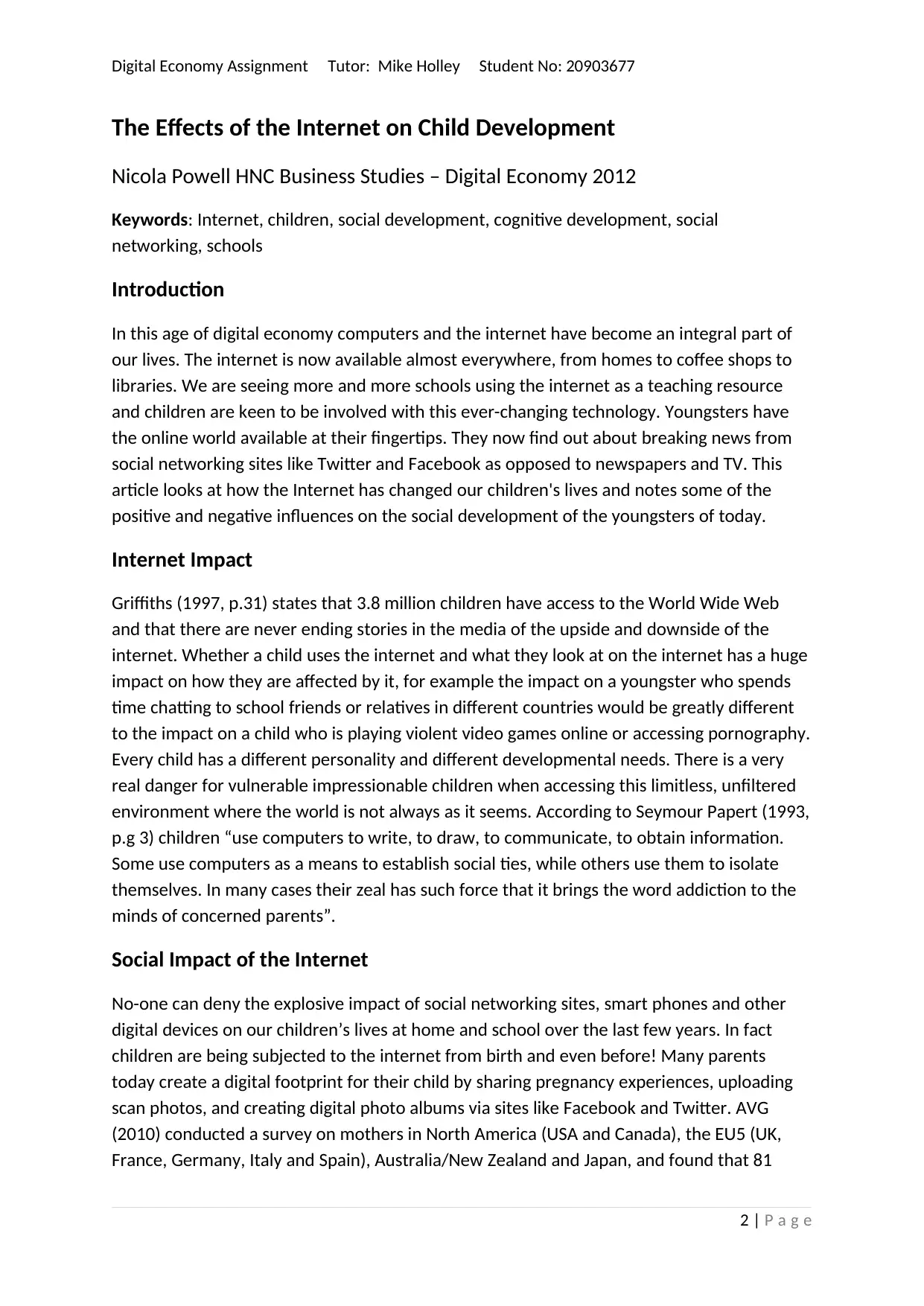
Digital Economy Assignment Tutor: Mike Holley Student No: 20903677
The Effects of the Internet on Child Development
Nicola Powell HNC Business Studies – Digital Economy 2012
Keywords: Internet, children, social development, cognitive development, social
networking, schools
Introduction
In this age of digital economy computers and the internet have become an integral part of
our lives. The internet is now available almost everywhere, from homes to coffee shops to
libraries. We are seeing more and more schools using the internet as a teaching resource
and children are keen to be involved with this ever-changing technology. Youngsters have
the online world available at their fingertips. They now find out about breaking news from
social networking sites like Twitter and Facebook as opposed to newspapers and TV. This
article looks at how the Internet has changed our children's lives and notes some of the
positive and negative influences on the social development of the youngsters of today.
Internet Impact
Griffiths (1997, p.31) states that 3.8 million children have access to the World Wide Web
and that there are never ending stories in the media of the upside and downside of the
internet. Whether a child uses the internet and what they look at on the internet has a huge
impact on how they are affected by it, for example the impact on a youngster who spends
time chatting to school friends or relatives in different countries would be greatly different
to the impact on a child who is playing violent video games online or accessing pornography.
Every child has a different personality and different developmental needs. There is a very
real danger for vulnerable impressionable children when accessing this limitless, unfiltered
environment where the world is not always as it seems. According to Seymour Papert (1993,
p.g 3) children “use computers to write, to draw, to communicate, to obtain information.
Some use computers as a means to establish social ties, while others use them to isolate
themselves. In many cases their zeal has such force that it brings the word addiction to the
minds of concerned parents”.
Social Impact of the Internet
No-one can deny the explosive impact of social networking sites, smart phones and other
digital devices on our children’s lives at home and school over the last few years. In fact
children are being subjected to the internet from birth and even before! Many parents
today create a digital footprint for their child by sharing pregnancy experiences, uploading
scan photos, and creating digital photo albums via sites like Facebook and Twitter. AVG
(2010) conducted a survey on mothers in North America (USA and Canada), the EU5 (UK,
France, Germany, Italy and Spain), Australia/New Zealand and Japan, and found that 81
2 | P a g e
The Effects of the Internet on Child Development
Nicola Powell HNC Business Studies – Digital Economy 2012
Keywords: Internet, children, social development, cognitive development, social
networking, schools
Introduction
In this age of digital economy computers and the internet have become an integral part of
our lives. The internet is now available almost everywhere, from homes to coffee shops to
libraries. We are seeing more and more schools using the internet as a teaching resource
and children are keen to be involved with this ever-changing technology. Youngsters have
the online world available at their fingertips. They now find out about breaking news from
social networking sites like Twitter and Facebook as opposed to newspapers and TV. This
article looks at how the Internet has changed our children's lives and notes some of the
positive and negative influences on the social development of the youngsters of today.
Internet Impact
Griffiths (1997, p.31) states that 3.8 million children have access to the World Wide Web
and that there are never ending stories in the media of the upside and downside of the
internet. Whether a child uses the internet and what they look at on the internet has a huge
impact on how they are affected by it, for example the impact on a youngster who spends
time chatting to school friends or relatives in different countries would be greatly different
to the impact on a child who is playing violent video games online or accessing pornography.
Every child has a different personality and different developmental needs. There is a very
real danger for vulnerable impressionable children when accessing this limitless, unfiltered
environment where the world is not always as it seems. According to Seymour Papert (1993,
p.g 3) children “use computers to write, to draw, to communicate, to obtain information.
Some use computers as a means to establish social ties, while others use them to isolate
themselves. In many cases their zeal has such force that it brings the word addiction to the
minds of concerned parents”.
Social Impact of the Internet
No-one can deny the explosive impact of social networking sites, smart phones and other
digital devices on our children’s lives at home and school over the last few years. In fact
children are being subjected to the internet from birth and even before! Many parents
today create a digital footprint for their child by sharing pregnancy experiences, uploading
scan photos, and creating digital photo albums via sites like Facebook and Twitter. AVG
(2010) conducted a survey on mothers in North America (USA and Canada), the EU5 (UK,
France, Germany, Italy and Spain), Australia/New Zealand and Japan, and found that 81
2 | P a g e
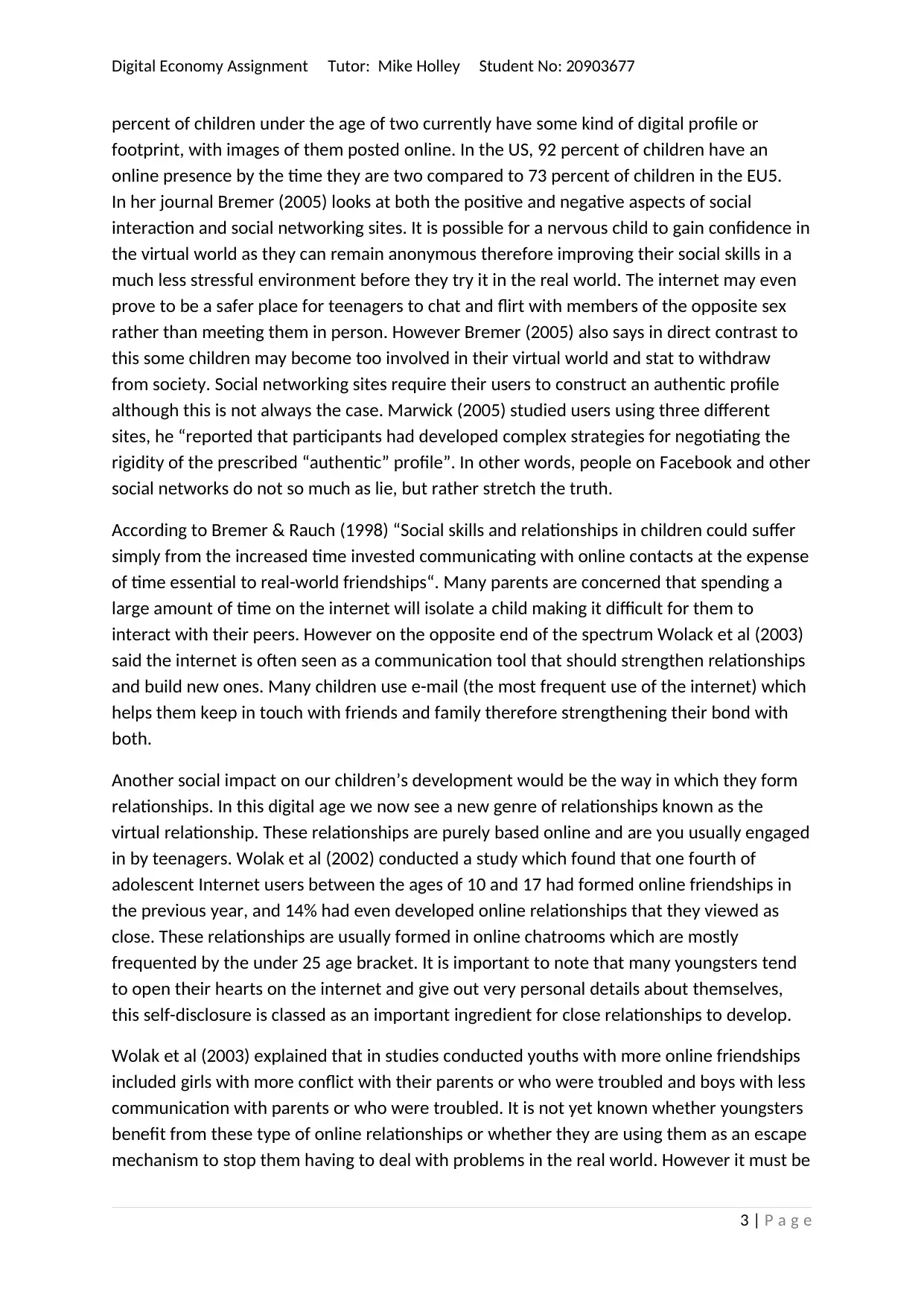
Digital Economy Assignment Tutor: Mike Holley Student No: 20903677
percent of children under the age of two currently have some kind of digital profile or
footprint, with images of them posted online. In the US, 92 percent of children have an
online presence by the time they are two compared to 73 percent of children in the EU5.
In her journal Bremer (2005) looks at both the positive and negative aspects of social
interaction and social networking sites. It is possible for a nervous child to gain confidence in
the virtual world as they can remain anonymous therefore improving their social skills in a
much less stressful environment before they try it in the real world. The internet may even
prove to be a safer place for teenagers to chat and flirt with members of the opposite sex
rather than meeting them in person. However Bremer (2005) also says in direct contrast to
this some children may become too involved in their virtual world and stat to withdraw
from society. Social networking sites require their users to construct an authentic profile
although this is not always the case. Marwick (2005) studied users using three different
sites, he “reported that participants had developed complex strategies for negotiating the
rigidity of the prescribed “authentic” profile”. In other words, people on Facebook and other
social networks do not so much as lie, but rather stretch the truth.
According to Bremer & Rauch (1998) “Social skills and relationships in children could suffer
simply from the increased time invested communicating with online contacts at the expense
of time essential to real-world friendships“. Many parents are concerned that spending a
large amount of time on the internet will isolate a child making it difficult for them to
interact with their peers. However on the opposite end of the spectrum Wolack et al (2003)
said the internet is often seen as a communication tool that should strengthen relationships
and build new ones. Many children use e-mail (the most frequent use of the internet) which
helps them keep in touch with friends and family therefore strengthening their bond with
both.
Another social impact on our children’s development would be the way in which they form
relationships. In this digital age we now see a new genre of relationships known as the
virtual relationship. These relationships are purely based online and are you usually engaged
in by teenagers. Wolak et al (2002) conducted a study which found that one fourth of
adolescent Internet users between the ages of 10 and 17 had formed online friendships in
the previous year, and 14% had even developed online relationships that they viewed as
close. These relationships are usually formed in online chatrooms which are mostly
frequented by the under 25 age bracket. It is important to note that many youngsters tend
to open their hearts on the internet and give out very personal details about themselves,
this self-disclosure is classed as an important ingredient for close relationships to develop.
Wolak et al (2003) explained that in studies conducted youths with more online friendships
included girls with more conflict with their parents or who were troubled and boys with less
communication with parents or who were troubled. It is not yet known whether youngsters
benefit from these type of online relationships or whether they are using them as an escape
mechanism to stop them having to deal with problems in the real world. However it must be
3 | P a g e
percent of children under the age of two currently have some kind of digital profile or
footprint, with images of them posted online. In the US, 92 percent of children have an
online presence by the time they are two compared to 73 percent of children in the EU5.
In her journal Bremer (2005) looks at both the positive and negative aspects of social
interaction and social networking sites. It is possible for a nervous child to gain confidence in
the virtual world as they can remain anonymous therefore improving their social skills in a
much less stressful environment before they try it in the real world. The internet may even
prove to be a safer place for teenagers to chat and flirt with members of the opposite sex
rather than meeting them in person. However Bremer (2005) also says in direct contrast to
this some children may become too involved in their virtual world and stat to withdraw
from society. Social networking sites require their users to construct an authentic profile
although this is not always the case. Marwick (2005) studied users using three different
sites, he “reported that participants had developed complex strategies for negotiating the
rigidity of the prescribed “authentic” profile”. In other words, people on Facebook and other
social networks do not so much as lie, but rather stretch the truth.
According to Bremer & Rauch (1998) “Social skills and relationships in children could suffer
simply from the increased time invested communicating with online contacts at the expense
of time essential to real-world friendships“. Many parents are concerned that spending a
large amount of time on the internet will isolate a child making it difficult for them to
interact with their peers. However on the opposite end of the spectrum Wolack et al (2003)
said the internet is often seen as a communication tool that should strengthen relationships
and build new ones. Many children use e-mail (the most frequent use of the internet) which
helps them keep in touch with friends and family therefore strengthening their bond with
both.
Another social impact on our children’s development would be the way in which they form
relationships. In this digital age we now see a new genre of relationships known as the
virtual relationship. These relationships are purely based online and are you usually engaged
in by teenagers. Wolak et al (2002) conducted a study which found that one fourth of
adolescent Internet users between the ages of 10 and 17 had formed online friendships in
the previous year, and 14% had even developed online relationships that they viewed as
close. These relationships are usually formed in online chatrooms which are mostly
frequented by the under 25 age bracket. It is important to note that many youngsters tend
to open their hearts on the internet and give out very personal details about themselves,
this self-disclosure is classed as an important ingredient for close relationships to develop.
Wolak et al (2003) explained that in studies conducted youths with more online friendships
included girls with more conflict with their parents or who were troubled and boys with less
communication with parents or who were troubled. It is not yet known whether youngsters
benefit from these type of online relationships or whether they are using them as an escape
mechanism to stop them having to deal with problems in the real world. However it must be
3 | P a g e
⊘ This is a preview!⊘
Do you want full access?
Subscribe today to unlock all pages.

Trusted by 1+ million students worldwide
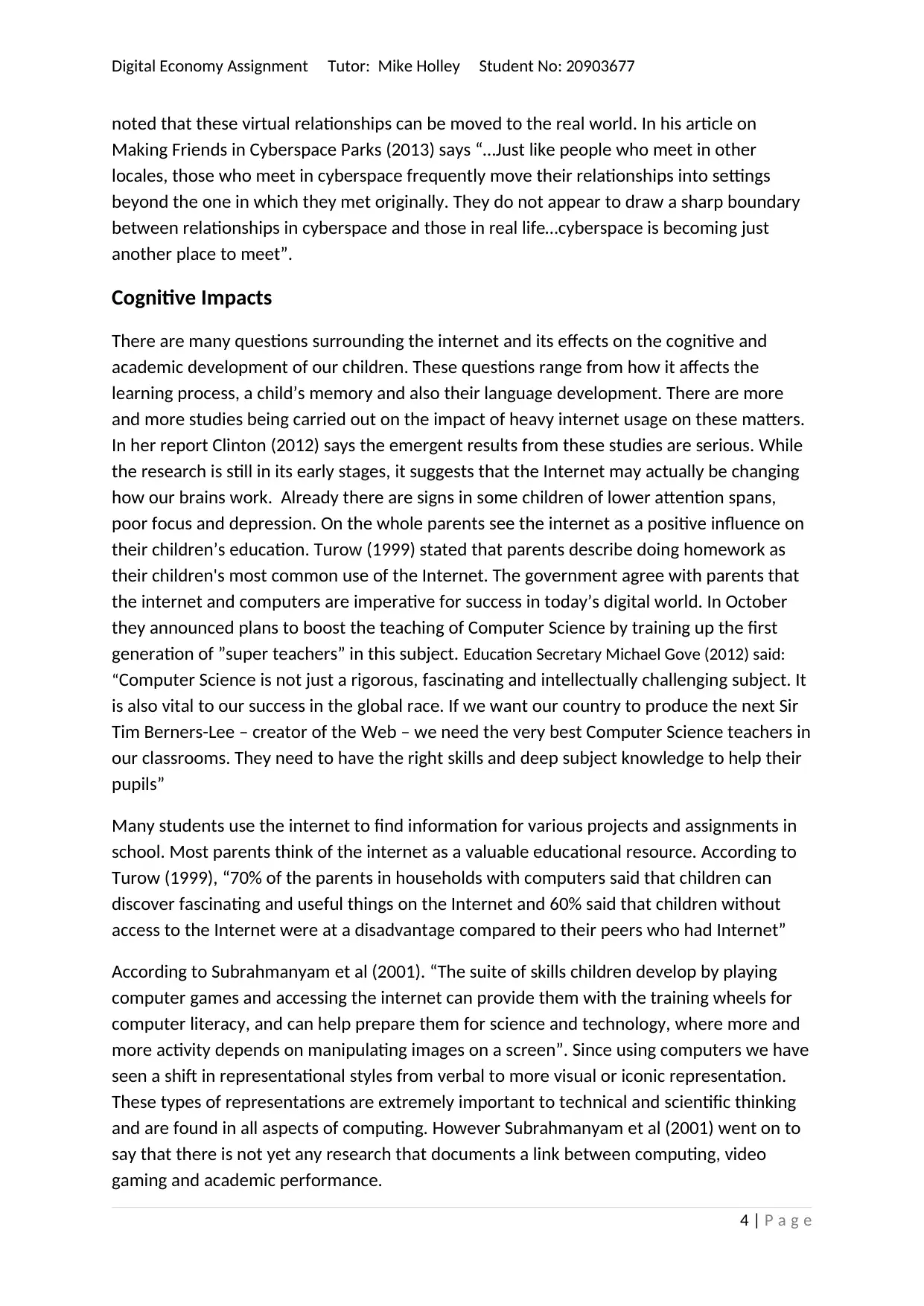
Digital Economy Assignment Tutor: Mike Holley Student No: 20903677
noted that these virtual relationships can be moved to the real world. In his article on
Making Friends in Cyberspace Parks (2013) says “…Just like people who meet in other
locales, those who meet in cyberspace frequently move their relationships into settings
beyond the one in which they met originally. They do not appear to draw a sharp boundary
between relationships in cyberspace and those in real life…cyberspace is becoming just
another place to meet”.
Cognitive Impacts
There are many questions surrounding the internet and its effects on the cognitive and
academic development of our children. These questions range from how it affects the
learning process, a child’s memory and also their language development. There are more
and more studies being carried out on the impact of heavy internet usage on these matters.
In her report Clinton (2012) says the emergent results from these studies are serious. While
the research is still in its early stages, it suggests that the Internet may actually be changing
how our brains work. Already there are signs in some children of lower attention spans,
poor focus and depression. On the whole parents see the internet as a positive influence on
their children’s education. Turow (1999) stated that parents describe doing homework as
their children's most common use of the Internet. The government agree with parents that
the internet and computers are imperative for success in today’s digital world. In October
they announced plans to boost the teaching of Computer Science by training up the first
generation of ”super teachers” in this subject. Education Secretary Michael Gove (2012) said:
“Computer Science is not just a rigorous, fascinating and intellectually challenging subject. It
is also vital to our success in the global race. If we want our country to produce the next Sir
Tim Berners-Lee – creator of the Web – we need the very best Computer Science teachers in
our classrooms. They need to have the right skills and deep subject knowledge to help their
pupils”
Many students use the internet to find information for various projects and assignments in
school. Most parents think of the internet as a valuable educational resource. According to
Turow (1999), “70% of the parents in households with computers said that children can
discover fascinating and useful things on the Internet and 60% said that children without
access to the Internet were at a disadvantage compared to their peers who had Internet”
According to Subrahmanyam et al (2001). “The suite of skills children develop by playing
computer games and accessing the internet can provide them with the training wheels for
computer literacy, and can help prepare them for science and technology, where more and
more activity depends on manipulating images on a screen”. Since using computers we have
seen a shift in representational styles from verbal to more visual or iconic representation.
These types of representations are extremely important to technical and scientific thinking
and are found in all aspects of computing. However Subrahmanyam et al (2001) went on to
say that there is not yet any research that documents a link between computing, video
gaming and academic performance.
4 | P a g e
noted that these virtual relationships can be moved to the real world. In his article on
Making Friends in Cyberspace Parks (2013) says “…Just like people who meet in other
locales, those who meet in cyberspace frequently move their relationships into settings
beyond the one in which they met originally. They do not appear to draw a sharp boundary
between relationships in cyberspace and those in real life…cyberspace is becoming just
another place to meet”.
Cognitive Impacts
There are many questions surrounding the internet and its effects on the cognitive and
academic development of our children. These questions range from how it affects the
learning process, a child’s memory and also their language development. There are more
and more studies being carried out on the impact of heavy internet usage on these matters.
In her report Clinton (2012) says the emergent results from these studies are serious. While
the research is still in its early stages, it suggests that the Internet may actually be changing
how our brains work. Already there are signs in some children of lower attention spans,
poor focus and depression. On the whole parents see the internet as a positive influence on
their children’s education. Turow (1999) stated that parents describe doing homework as
their children's most common use of the Internet. The government agree with parents that
the internet and computers are imperative for success in today’s digital world. In October
they announced plans to boost the teaching of Computer Science by training up the first
generation of ”super teachers” in this subject. Education Secretary Michael Gove (2012) said:
“Computer Science is not just a rigorous, fascinating and intellectually challenging subject. It
is also vital to our success in the global race. If we want our country to produce the next Sir
Tim Berners-Lee – creator of the Web – we need the very best Computer Science teachers in
our classrooms. They need to have the right skills and deep subject knowledge to help their
pupils”
Many students use the internet to find information for various projects and assignments in
school. Most parents think of the internet as a valuable educational resource. According to
Turow (1999), “70% of the parents in households with computers said that children can
discover fascinating and useful things on the Internet and 60% said that children without
access to the Internet were at a disadvantage compared to their peers who had Internet”
According to Subrahmanyam et al (2001). “The suite of skills children develop by playing
computer games and accessing the internet can provide them with the training wheels for
computer literacy, and can help prepare them for science and technology, where more and
more activity depends on manipulating images on a screen”. Since using computers we have
seen a shift in representational styles from verbal to more visual or iconic representation.
These types of representations are extremely important to technical and scientific thinking
and are found in all aspects of computing. However Subrahmanyam et al (2001) went on to
say that there is not yet any research that documents a link between computing, video
gaming and academic performance.
4 | P a g e
Paraphrase This Document
Need a fresh take? Get an instant paraphrase of this document with our AI Paraphraser
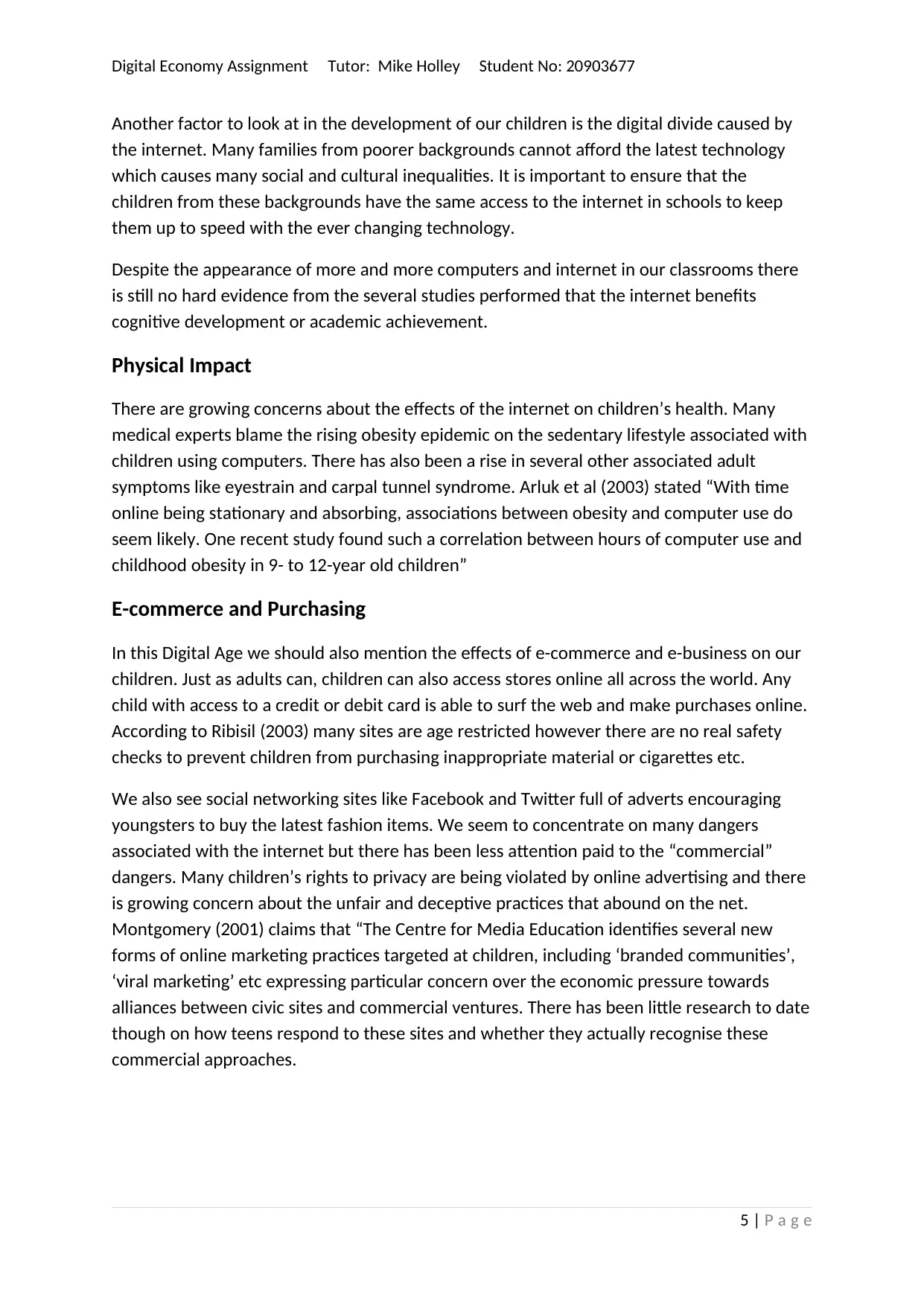
Digital Economy Assignment Tutor: Mike Holley Student No: 20903677
Another factor to look at in the development of our children is the digital divide caused by
the internet. Many families from poorer backgrounds cannot afford the latest technology
which causes many social and cultural inequalities. It is important to ensure that the
children from these backgrounds have the same access to the internet in schools to keep
them up to speed with the ever changing technology.
Despite the appearance of more and more computers and internet in our classrooms there
is still no hard evidence from the several studies performed that the internet benefits
cognitive development or academic achievement.
Physical Impact
There are growing concerns about the effects of the internet on children’s health. Many
medical experts blame the rising obesity epidemic on the sedentary lifestyle associated with
children using computers. There has also been a rise in several other associated adult
symptoms like eyestrain and carpal tunnel syndrome. Arluk et al (2003) stated “With time
online being stationary and absorbing, associations between obesity and computer use do
seem likely. One recent study found such a correlation between hours of computer use and
childhood obesity in 9- to 12-year old children”
E-commerce and Purchasing
In this Digital Age we should also mention the effects of e-commerce and e-business on our
children. Just as adults can, children can also access stores online all across the world. Any
child with access to a credit or debit card is able to surf the web and make purchases online.
According to Ribisil (2003) many sites are age restricted however there are no real safety
checks to prevent children from purchasing inappropriate material or cigarettes etc.
We also see social networking sites like Facebook and Twitter full of adverts encouraging
youngsters to buy the latest fashion items. We seem to concentrate on many dangers
associated with the internet but there has been less attention paid to the “commercial”
dangers. Many children’s rights to privacy are being violated by online advertising and there
is growing concern about the unfair and deceptive practices that abound on the net.
Montgomery (2001) claims that “The Centre for Media Education identifies several new
forms of online marketing practices targeted at children, including ‘branded communities’,
‘viral marketing’ etc expressing particular concern over the economic pressure towards
alliances between civic sites and commercial ventures. There has been little research to date
though on how teens respond to these sites and whether they actually recognise these
commercial approaches.
5 | P a g e
Another factor to look at in the development of our children is the digital divide caused by
the internet. Many families from poorer backgrounds cannot afford the latest technology
which causes many social and cultural inequalities. It is important to ensure that the
children from these backgrounds have the same access to the internet in schools to keep
them up to speed with the ever changing technology.
Despite the appearance of more and more computers and internet in our classrooms there
is still no hard evidence from the several studies performed that the internet benefits
cognitive development or academic achievement.
Physical Impact
There are growing concerns about the effects of the internet on children’s health. Many
medical experts blame the rising obesity epidemic on the sedentary lifestyle associated with
children using computers. There has also been a rise in several other associated adult
symptoms like eyestrain and carpal tunnel syndrome. Arluk et al (2003) stated “With time
online being stationary and absorbing, associations between obesity and computer use do
seem likely. One recent study found such a correlation between hours of computer use and
childhood obesity in 9- to 12-year old children”
E-commerce and Purchasing
In this Digital Age we should also mention the effects of e-commerce and e-business on our
children. Just as adults can, children can also access stores online all across the world. Any
child with access to a credit or debit card is able to surf the web and make purchases online.
According to Ribisil (2003) many sites are age restricted however there are no real safety
checks to prevent children from purchasing inappropriate material or cigarettes etc.
We also see social networking sites like Facebook and Twitter full of adverts encouraging
youngsters to buy the latest fashion items. We seem to concentrate on many dangers
associated with the internet but there has been less attention paid to the “commercial”
dangers. Many children’s rights to privacy are being violated by online advertising and there
is growing concern about the unfair and deceptive practices that abound on the net.
Montgomery (2001) claims that “The Centre for Media Education identifies several new
forms of online marketing practices targeted at children, including ‘branded communities’,
‘viral marketing’ etc expressing particular concern over the economic pressure towards
alliances between civic sites and commercial ventures. There has been little research to date
though on how teens respond to these sites and whether they actually recognise these
commercial approaches.
5 | P a g e
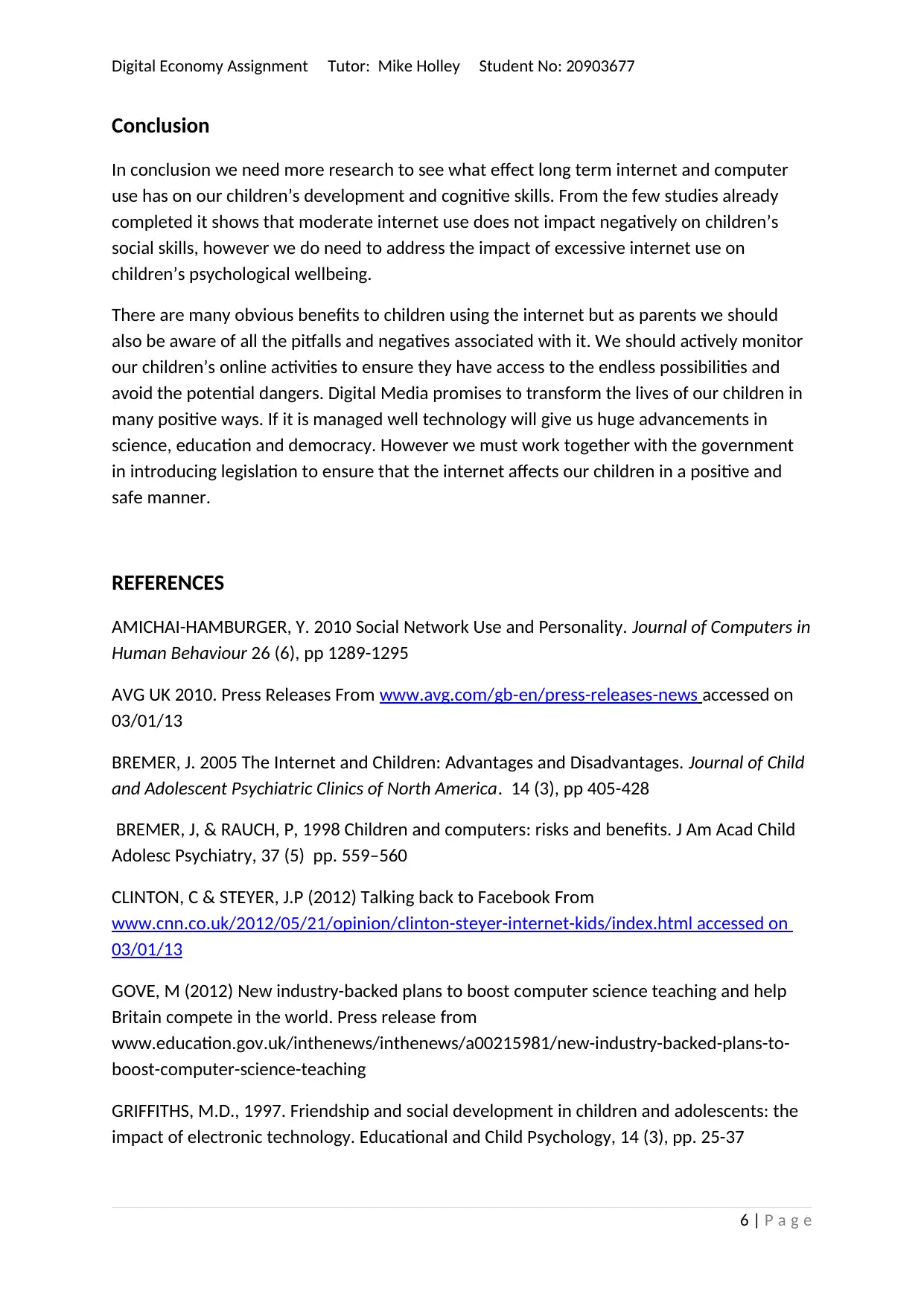
Digital Economy Assignment Tutor: Mike Holley Student No: 20903677
Conclusion
In conclusion we need more research to see what effect long term internet and computer
use has on our children’s development and cognitive skills. From the few studies already
completed it shows that moderate internet use does not impact negatively on children’s
social skills, however we do need to address the impact of excessive internet use on
children’s psychological wellbeing.
There are many obvious benefits to children using the internet but as parents we should
also be aware of all the pitfalls and negatives associated with it. We should actively monitor
our children’s online activities to ensure they have access to the endless possibilities and
avoid the potential dangers. Digital Media promises to transform the lives of our children in
many positive ways. If it is managed well technology will give us huge advancements in
science, education and democracy. However we must work together with the government
in introducing legislation to ensure that the internet affects our children in a positive and
safe manner.
REFERENCES
AMICHAI-HAMBURGER, Y. 2010 Social Network Use and Personality. Journal of Computers in
Human Behaviour 26 (6), pp 1289-1295
AVG UK 2010. Press Releases From www.avg.com/gb-en/press-releases-news accessed on
03/01/13
BREMER, J. 2005 The Internet and Children: Advantages and Disadvantages. Journal of Child
and Adolescent Psychiatric Clinics of North America. 14 (3), pp 405-428
BREMER, J, & RAUCH, P, 1998 Children and computers: risks and benefits. J Am Acad Child
Adolesc Psychiatry, 37 (5) pp. 559–560
CLINTON, C & STEYER, J.P (2012) Talking back to Facebook From
www.cnn.co.uk/2012/05/21/opinion/clinton-steyer-internet-kids/index.html accessed on
03/01/13
GOVE, M (2012) New industry-backed plans to boost computer science teaching and help
Britain compete in the world. Press release from
www.education.gov.uk/inthenews/inthenews/a00215981/new-industry-backed-plans-to-
boost-computer-science-teaching
GRIFFITHS, M.D., 1997. Friendship and social development in children and adolescents: the
impact of electronic technology. Educational and Child Psychology, 14 (3), pp. 25-37
6 | P a g e
Conclusion
In conclusion we need more research to see what effect long term internet and computer
use has on our children’s development and cognitive skills. From the few studies already
completed it shows that moderate internet use does not impact negatively on children’s
social skills, however we do need to address the impact of excessive internet use on
children’s psychological wellbeing.
There are many obvious benefits to children using the internet but as parents we should
also be aware of all the pitfalls and negatives associated with it. We should actively monitor
our children’s online activities to ensure they have access to the endless possibilities and
avoid the potential dangers. Digital Media promises to transform the lives of our children in
many positive ways. If it is managed well technology will give us huge advancements in
science, education and democracy. However we must work together with the government
in introducing legislation to ensure that the internet affects our children in a positive and
safe manner.
REFERENCES
AMICHAI-HAMBURGER, Y. 2010 Social Network Use and Personality. Journal of Computers in
Human Behaviour 26 (6), pp 1289-1295
AVG UK 2010. Press Releases From www.avg.com/gb-en/press-releases-news accessed on
03/01/13
BREMER, J. 2005 The Internet and Children: Advantages and Disadvantages. Journal of Child
and Adolescent Psychiatric Clinics of North America. 14 (3), pp 405-428
BREMER, J, & RAUCH, P, 1998 Children and computers: risks and benefits. J Am Acad Child
Adolesc Psychiatry, 37 (5) pp. 559–560
CLINTON, C & STEYER, J.P (2012) Talking back to Facebook From
www.cnn.co.uk/2012/05/21/opinion/clinton-steyer-internet-kids/index.html accessed on
03/01/13
GOVE, M (2012) New industry-backed plans to boost computer science teaching and help
Britain compete in the world. Press release from
www.education.gov.uk/inthenews/inthenews/a00215981/new-industry-backed-plans-to-
boost-computer-science-teaching
GRIFFITHS, M.D., 1997. Friendship and social development in children and adolescents: the
impact of electronic technology. Educational and Child Psychology, 14 (3), pp. 25-37
6 | P a g e
⊘ This is a preview!⊘
Do you want full access?
Subscribe today to unlock all pages.

Trusted by 1+ million students worldwide
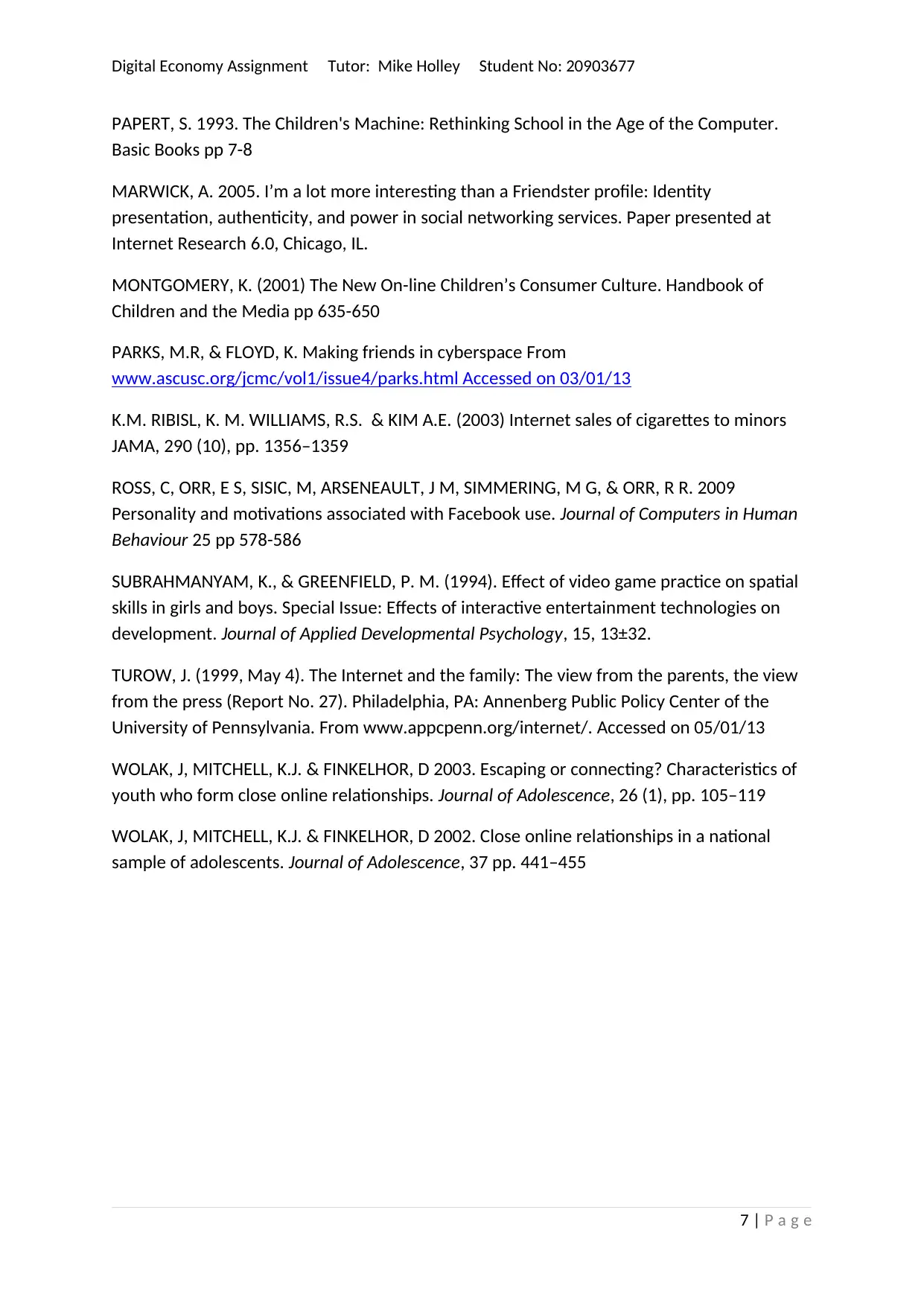
Digital Economy Assignment Tutor: Mike Holley Student No: 20903677
PAPERT, S. 1993. The Children's Machine: Rethinking School in the Age of the Computer.
Basic Books pp 7-8
MARWICK, A. 2005. I’m a lot more interesting than a Friendster profile: Identity
presentation, authenticity, and power in social networking services. Paper presented at
Internet Research 6.0, Chicago, IL.
MONTGOMERY, K. (2001) The New On-line Children’s Consumer Culture. Handbook of
Children and the Media pp 635-650
PARKS, M.R, & FLOYD, K. Making friends in cyberspace From
www.ascusc.org/jcmc/vol1/issue4/parks.html Accessed on 03/01/13
K.M. RIBISL, K. M. WILLIAMS, R.S. & KIM A.E. (2003) Internet sales of cigarettes to minors
JAMA, 290 (10), pp. 1356–1359
ROSS, C, ORR, E S, SISIC, M, ARSENEAULT, J M, SIMMERING, M G, & ORR, R R. 2009
Personality and motivations associated with Facebook use. Journal of Computers in Human
Behaviour 25 pp 578-586
SUBRAHMANYAM, K., & GREENFIELD, P. M. (1994). Effect of video game practice on spatial
skills in girls and boys. Special Issue: Effects of interactive entertainment technologies on
development. Journal of Applied Developmental Psychology, 15, 13±32.
TUROW, J. (1999, May 4). The Internet and the family: The view from the parents, the view
from the press (Report No. 27). Philadelphia, PA: Annenberg Public Policy Center of the
University of Pennsylvania. From www.appcpenn.org/internet/. Accessed on 05/01/13
WOLAK, J, MITCHELL, K.J. & FINKELHOR, D 2003. Escaping or connecting? Characteristics of
youth who form close online relationships. Journal of Adolescence, 26 (1), pp. 105–119
WOLAK, J, MITCHELL, K.J. & FINKELHOR, D 2002. Close online relationships in a national
sample of adolescents. Journal of Adolescence, 37 pp. 441–455
7 | P a g e
PAPERT, S. 1993. The Children's Machine: Rethinking School in the Age of the Computer.
Basic Books pp 7-8
MARWICK, A. 2005. I’m a lot more interesting than a Friendster profile: Identity
presentation, authenticity, and power in social networking services. Paper presented at
Internet Research 6.0, Chicago, IL.
MONTGOMERY, K. (2001) The New On-line Children’s Consumer Culture. Handbook of
Children and the Media pp 635-650
PARKS, M.R, & FLOYD, K. Making friends in cyberspace From
www.ascusc.org/jcmc/vol1/issue4/parks.html Accessed on 03/01/13
K.M. RIBISL, K. M. WILLIAMS, R.S. & KIM A.E. (2003) Internet sales of cigarettes to minors
JAMA, 290 (10), pp. 1356–1359
ROSS, C, ORR, E S, SISIC, M, ARSENEAULT, J M, SIMMERING, M G, & ORR, R R. 2009
Personality and motivations associated with Facebook use. Journal of Computers in Human
Behaviour 25 pp 578-586
SUBRAHMANYAM, K., & GREENFIELD, P. M. (1994). Effect of video game practice on spatial
skills in girls and boys. Special Issue: Effects of interactive entertainment technologies on
development. Journal of Applied Developmental Psychology, 15, 13±32.
TUROW, J. (1999, May 4). The Internet and the family: The view from the parents, the view
from the press (Report No. 27). Philadelphia, PA: Annenberg Public Policy Center of the
University of Pennsylvania. From www.appcpenn.org/internet/. Accessed on 05/01/13
WOLAK, J, MITCHELL, K.J. & FINKELHOR, D 2003. Escaping or connecting? Characteristics of
youth who form close online relationships. Journal of Adolescence, 26 (1), pp. 105–119
WOLAK, J, MITCHELL, K.J. & FINKELHOR, D 2002. Close online relationships in a national
sample of adolescents. Journal of Adolescence, 37 pp. 441–455
7 | P a g e
Paraphrase This Document
Need a fresh take? Get an instant paraphrase of this document with our AI Paraphraser
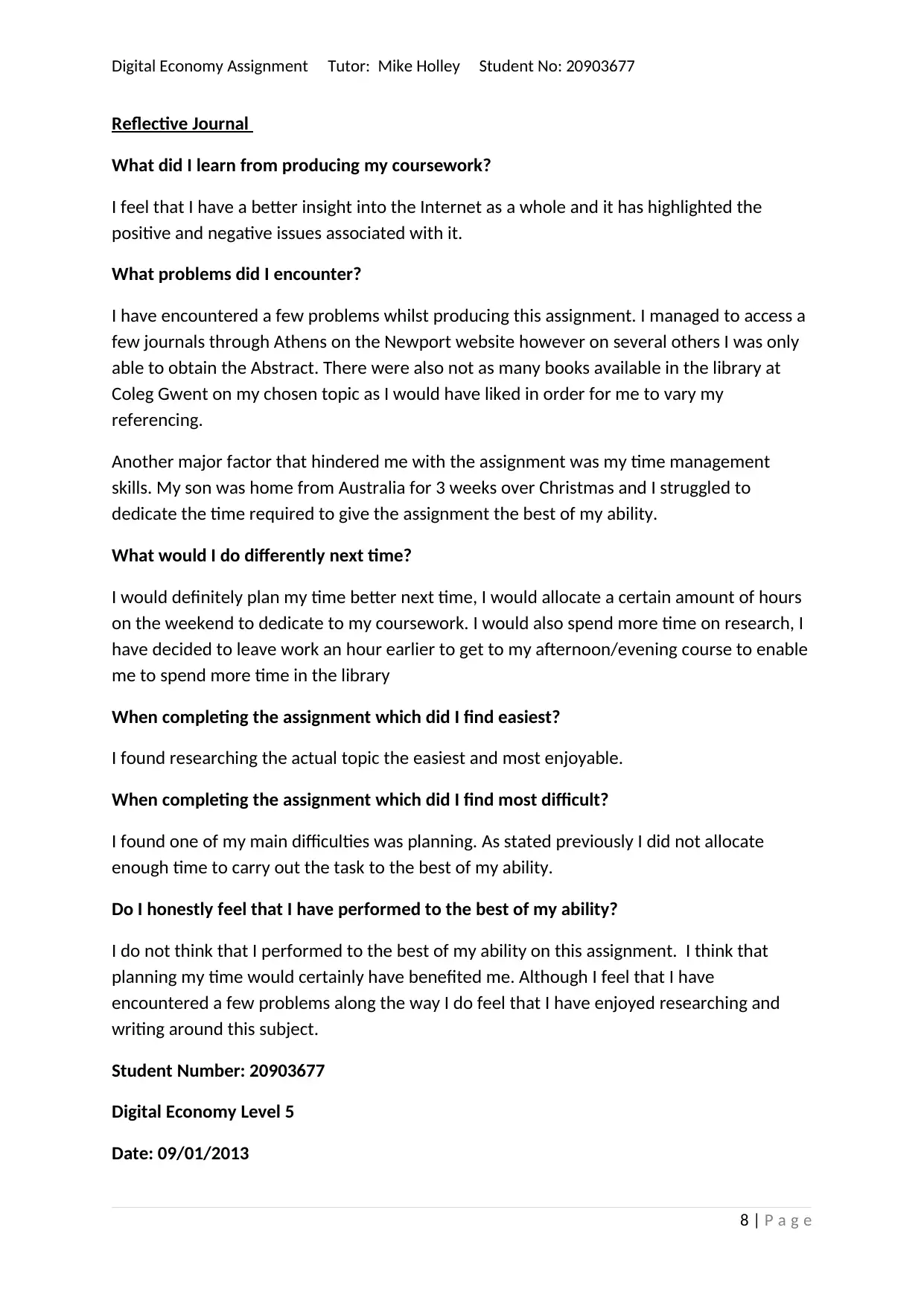
Digital Economy Assignment Tutor: Mike Holley Student No: 20903677
Reflective Journal
What did I learn from producing my coursework?
I feel that I have a better insight into the Internet as a whole and it has highlighted the
positive and negative issues associated with it.
What problems did I encounter?
I have encountered a few problems whilst producing this assignment. I managed to access a
few journals through Athens on the Newport website however on several others I was only
able to obtain the Abstract. There were also not as many books available in the library at
Coleg Gwent on my chosen topic as I would have liked in order for me to vary my
referencing.
Another major factor that hindered me with the assignment was my time management
skills. My son was home from Australia for 3 weeks over Christmas and I struggled to
dedicate the time required to give the assignment the best of my ability.
What would I do differently next time?
I would definitely plan my time better next time, I would allocate a certain amount of hours
on the weekend to dedicate to my coursework. I would also spend more time on research, I
have decided to leave work an hour earlier to get to my afternoon/evening course to enable
me to spend more time in the library
When completing the assignment which did I find easiest?
I found researching the actual topic the easiest and most enjoyable.
When completing the assignment which did I find most difficult?
I found one of my main difficulties was planning. As stated previously I did not allocate
enough time to carry out the task to the best of my ability.
Do I honestly feel that I have performed to the best of my ability?
I do not think that I performed to the best of my ability on this assignment. I think that
planning my time would certainly have benefited me. Although I feel that I have
encountered a few problems along the way I do feel that I have enjoyed researching and
writing around this subject.
Student Number: 20903677
Digital Economy Level 5
Date: 09/01/2013
8 | P a g e
Reflective Journal
What did I learn from producing my coursework?
I feel that I have a better insight into the Internet as a whole and it has highlighted the
positive and negative issues associated with it.
What problems did I encounter?
I have encountered a few problems whilst producing this assignment. I managed to access a
few journals through Athens on the Newport website however on several others I was only
able to obtain the Abstract. There were also not as many books available in the library at
Coleg Gwent on my chosen topic as I would have liked in order for me to vary my
referencing.
Another major factor that hindered me with the assignment was my time management
skills. My son was home from Australia for 3 weeks over Christmas and I struggled to
dedicate the time required to give the assignment the best of my ability.
What would I do differently next time?
I would definitely plan my time better next time, I would allocate a certain amount of hours
on the weekend to dedicate to my coursework. I would also spend more time on research, I
have decided to leave work an hour earlier to get to my afternoon/evening course to enable
me to spend more time in the library
When completing the assignment which did I find easiest?
I found researching the actual topic the easiest and most enjoyable.
When completing the assignment which did I find most difficult?
I found one of my main difficulties was planning. As stated previously I did not allocate
enough time to carry out the task to the best of my ability.
Do I honestly feel that I have performed to the best of my ability?
I do not think that I performed to the best of my ability on this assignment. I think that
planning my time would certainly have benefited me. Although I feel that I have
encountered a few problems along the way I do feel that I have enjoyed researching and
writing around this subject.
Student Number: 20903677
Digital Economy Level 5
Date: 09/01/2013
8 | P a g e

Digital Economy Assignment Tutor: Mike Holley Student No: 20903677
9 | P a g e
9 | P a g e
⊘ This is a preview!⊘
Do you want full access?
Subscribe today to unlock all pages.

Trusted by 1+ million students worldwide
1 out of 9
Related Documents
Your All-in-One AI-Powered Toolkit for Academic Success.
+13062052269
info@desklib.com
Available 24*7 on WhatsApp / Email
![[object Object]](/_next/static/media/star-bottom.7253800d.svg)
Unlock your academic potential
Copyright © 2020–2026 A2Z Services. All Rights Reserved. Developed and managed by ZUCOL.





